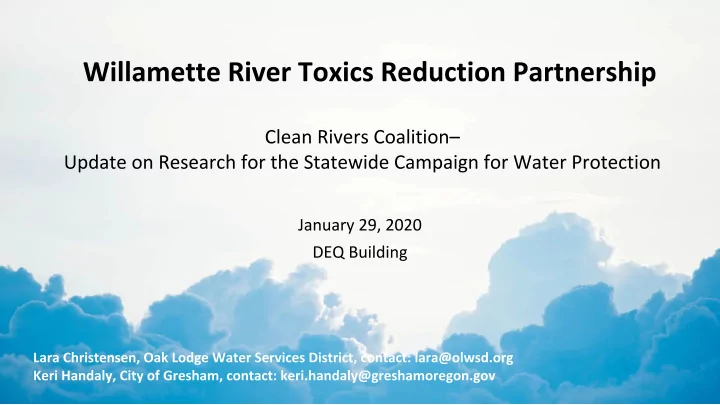

• • • •
•Online survey of N=1,000 Oregon residents •Conducted September 2019; 35 questions; 9 min •Quotas and weighting by area of state, age, gender identity, race/ethnicity, and education •Margin of error ±3.1%
•79% white n=789, 21% people of color (POC) n=211 • 5% black 5% Asian 7% LatinX 4% Indigenous 3% other or multiracial • POC By income: <50K = 63% $50-$100K = 27% >$100K = 10% • White By income: <50K = 57% $50-$100K = 30% >$100K = 13% • • •
Residents largely agree that products for insect and weed control or fertilization runoff and cause harm. Strongly Somewhat Agree These products harm fish and wildlife health Disagree Agree These products run off into local waterways Disagree Agree These products harm human health Disagree DHM RESEARCH | BRINK CLEAN RIVERS COALITION | SEPTEMBER 2019 7
• • • •
• • • • •
Products used that are most problematic (Relative Risk) ▪ Weed and feed combinations (2,4-D, Dicamba, Diuron, plus fertilizer) ▪ Blackberry and ivy killer (triclopyr) ▪ Fungicide to treat brown spots on lawn (propicanozole) ▪ Insect killers for fleas, ticks, mosquitos, mites, termites, aphids, snails, ants, yellow jackets (malathion, acetamiprid, imacloprid, permethrin) We will correlate with shelf surveys around the state DHM RESEARCH | BRINK CLEAN RIVERS COALITION | SEPTEMBER 2019 10
Barriers easiest to address: What do you consider when making a purchase? DHM RESEARCH | BRINK CLEAN RIVERS COALITION | SEPTEMBER 2019 11
Motivation to change: Desire to protect wildlife/fish #1 Very motivating Somewhat motivating Protect local waterways, prevent harm to fish and wildlife Protect health of children and pets Protect pollinators and our food supply DHM RESEARCH | BRINK CLEAN RIVERS COALITION | SEPTEMBER 2019 13
DHM Focus Group Methodology (Dec 2019) ▪ Two-focus groups of homeowners ▪ Responsible for lawn care ▪ Education: High School to Graduate Degree ▪ Income: low to >$150K ▪ Ages: ~30 to 55 ▪ Male = 8 Female = 9 ▪ White only = 14, White/Hispanic = 1 POC = 2 ▪ All use chemical products o Portland-Metro: N=7 o Greater Medford Area: N=10 DHM RESEARCH | BRINK CLEAN RIVERS COALITION FOCUS GROUPS | DECEMBER 2019 14
15
Participants echoed the statewide survey results: concerns about time, effectiveness, and cost. I think it just takes longer, some of the practices. Like I said, if you’re willing to be patient and wait for the problem to resolve itself through your new method, it’s worth it, to me. —Medford I’m more cynical. In the whole scheme of things, economically, I will buy whatever is the cheapest. —Portland DHM RESEARCH | BRINK CLEAN RIVERS COALITION FOCUS GROUPS | DECEMBER 2019 16
Oppositional priorities surfaced in both regions tested. My wife desires to have a clean, perfect lawn, and I have about three hours on a Saturday to make it good. I don’t have much time during the week to make it happen. So, I just want a one and done. —Medford I don’t like chemicals, because I don’t think they are healthy, but we have used Crossbow. —Medford DHM RESEARCH | BRINK CLEAN RIVERS COALITION FOCUS GROUPS | DECEMBER 2019 17
While they continue to use them, participants express concerns and confusion about chemical products. It’s so conflicting. I’m just so confused. You see [Roundup is] harmful to people because of cancer and Non-Hodgkin’s, you know? And yet people are still buying it. They’re still selling I just don’t like chemicals in general. I just don’t think they’re healthy for us as human Roundup. beings. We have used them though. My — Portland husband used Crossbow on some blackberry vines and whatnot, and they come back anyway. — Medford I have tried some natural ones, and when they failed, I went to something stronger. —Portland DHM RESEARCH | BRINK CLEAN RIVERS COALITION FOCUS GROUPS | DECEMBER 2019 18
We learned that we can’t succeed unless we propose an effective solution. First priority Second priority DHM RESEARCH | BRINK CLEAN RIVERS COALITION FOCUS GROUPS | DECEMBER 2019 19
Local waterways, fish, and wildlife are seen as most negatively impacted. I think eventually we poison ourselves. You’re hurting the wildlife and the surrounding area’s groundwater—everything that lives utilizes that ground water. And then eventually it’s going to get stuck in parts of the fish, and if it’s digested, we’re going to ingest it eventually. —Medford DHM RESEARCH | BRINK CLEAN RIVERS COALITION FOCUS GROUPS | DECEMBER 2019 20
Friends/Family/Gardening Experts/Stores Most Common Resource Local clerks and experts Online Word of mouth 6 most trusted 3 most trusted 7 most trusted 11 mentions 14 mentions 11 mentions DHM RESEARCH | BRINK CLEAN RIVERS COALITION FOCUS GROUPS | DECEMBER 2019 21
Recommend
More recommend